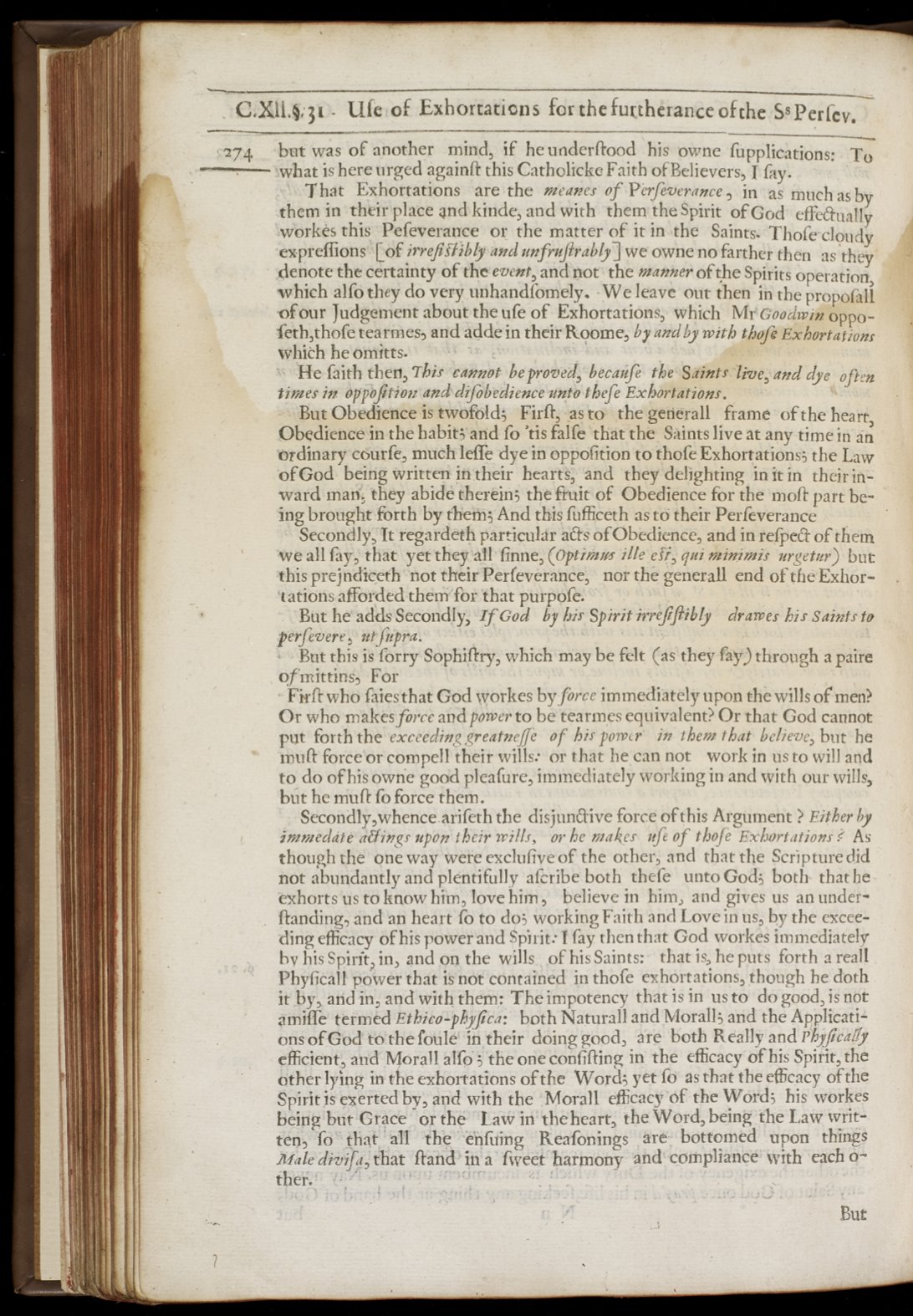

C.Xi11
;
;1
-
Life
of Exhortations
for
the
furtheranceofthe
SsPer[ev.
274
but
was
of
another
mind,
if
he underfrood
his
owne fupplications:
To
what
is
here urged
againff this
CatholickeFaith
of
Believers,
I fry.
That
Exhortations are the
meaner
of
Perfeverance, in
as
much
as
by
them
in
their
place and
kinde, and with them the
Spirit
of
God
effe&ually
workes this Pefeverance
or the matter
of
it
in
the
Saints.
Thofe
cloudy
expreffions
[of
irrefiflibly
andunfruflrably]
we
owne no farther then
as
they
denote
the certainty
of
the
event,
and not the
manner
of
the
Spirits
operation,
which alto
they
do very unhandfomely.
We
leave
out
then
in
the propofall
of
our Judgement about the
ufe
of
Exhortations,
which Mr
Goodwin
oppo-
feth,thofe
rearmes, and adde
in
theirRoome,
by
and
by
with
thofs Exhortations
which he omìtts.
He faith
then,
This cannot
be
proved,
becaufe the
Saints live,
and
dye often
times in
oppofition
and
difobedience unto
theft Exhortations.
But
Obedience
is
twofold;
Firff,
as
to the
generali frame
of
the
heart,
Obedience
in
the
habit;
and
fo 'tis falfe
that
the
Saints
live at any time in
an
ordinary courfe,
much
lefhe
dye
in
oppofition
to
thofe Exhortations; the
Law
ofGod
being written
in
their
hearts, and they delighting
in
it
in
their
in-
ward
man; they abide
therein; the fruit
of
Obedience for the molt part
be-
ing
brought
forth
by
them;
And
this
fufficeth
as
to
their Perfeverance
Secondly,
It regardeth
particular
a&s
of
Obedience, and
in refpeer
of
theta
we
all fay,
that
yet they
all
finne,
(optimzrs
ille efi,
qui
minimis urgetur)
but
this
prejndiceth not their Perfeverance, nor the generall end
of
theExhor-
tations afforded them for
that
purpofe.
But he adds Secondly,
If
God
by
his
Spirit
irrefiflibly drames
his
Saints
to
perfevere,
utopra.
But
this
is
lorry
Sophiftry, which
maybe
felt
(as
they fay)
through
a
paire
ofnsittins,
For
Fitft
who
fajes
that
God
workes
byforce
immediately upon the
wills
of
men?
Or
who makes force
and
power
to
be rearmes equivalent?
Or that
God cannot
put forth the
exceeding greatneffe
of
his
power
in
them
that
believe,
but
he
muff force
or
compell
their
wills:
or
that
he can
not work
in
tis
to
will
and
to
do
of
his
owne good pleafure, immediately working
in
and with
our
wills,
but
he muff
fo
force
them.
Secondly,whence.arifeththe
disjun&ive force
of
this
Argument
?
Either
by
immedáte aelings upontheir
mills, or
he
makes
ufe
of
thole
Exhortations
%
As
though the
one way were
exclufive
of
the
other,
and
that the
Scripture
did
not
abundantly and plentifully
of
ribe
both
thefe
unto God; both that
he
exhorts
us
to
know him, love
him,
believe
in
him, and
gives us an
under-
ftanding, and
an
heart
fo
to do; working Faith
and Love
in
us, by
the
excee-
ding
efficacy
of
his
powerand
Spirit:
I
fay
then
that
God
workes immediately
by his
Spirit, in,
and on
the
wills
of
his Saints:
that
is,
he
puts forth
a
reall
Phyficall
power
that
is
not contained
in
thofe exhortations, though he doth
it by,
and
in, and with them:
The
impotency
that
is
in us
to
do good,
is
not
amiflè
termed
Eth.ico
-phy
fca:
both Natural]
and Moral]; and the
Applicati-
ons
of
God
to
the
foule
in
their
doing good, are both Really and
Phyficai
y
efficient, and Moral
alfo;
the
one confining
in
the
efficacy
of
his
Spirit,
the
other
lying
in
the exhortations
of
the
Word;
yet
fo
as
that
the
efficacy
of
the
Spirit
is
exerted by, and with the Morali
efficacy
of
the Words
his workes
being
but
Grace or
the
Law in
the heart, the Word,
being
the
Law
writ-
ten,
fo
that
all
the
enfiting
Reafonings are bottomed upon
things
male
divifa,
that
Rand
in
a
fweet
harmony
and compliance with
each
o-
ther.
But










